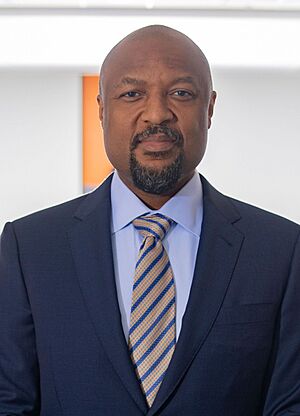Charles Lee Isbell Jr. facts for kids
Quick facts for kids
Charles Lee Isbell Jr.
|
|
|---|---|
 |
|
| Born | 18 December 1968 Chattanooga, Tennessee, U.S.
|
| Education | Georgia Institute of Technology (BS) Massachusetts Institute of Technology (PhD) |
| Scientific career | |
| Fields | Computer science |
| Institutions | Georgia Tech AT&T University of Wisconsin |
| Thesis | Sparse Multi-Level Representations for Text Retrieval |
| Doctoral advisor | Rodney Brooks Paul Viola |
Charles Lee Isbell Jr. is an American computer scientist, a researcher, and an educator. He is known for his work in artificial intelligence (AI) and machine learning. These are fields where computers learn from data and make smart decisions.
Currently, he is a top leader at the University of Wisconsin–Madison. He holds the title of Provost and Vice Chancellor for Academic Affairs. Before this, he was a professor at the Georgia Institute of Technology College of Computing. He even served as the Dean of the College from 2019 to 2023. Dr. Isbell has written over 100 scientific papers. He also strongly believes in making education available to everyone.
Contents
Early Life and Learning
Charles Isbell was born in 1968 in Chattanooga, Tennessee. He loved learning about computers from a young age.
College Days
In 1990, he earned his first degree from the Georgia Institute of Technology. He studied information and computer science. He was even named the top student by the university president!
Advanced Studies
After that, he received special scholarships from AT&T Bell Labs and the NSF. These helped him continue his studies at the Massachusetts Institute of Technology (MIT). At MIT, he focused on artificial intelligence and machine learning. He earned his PhD from MIT in 1998.
First Jobs
After finishing his PhD, Dr. Isbell worked at AT&T Labs – Research. In 2002, he returned to Georgia Tech as a professor. In 2023, he moved to the University of Wisconsin to become their Provost.
Career in Education
At Georgia Tech, Dr. Isbell worked hard to improve how computer science was taught.
Changing Computer Education
In 2006, he won an award for his work on "Threads." This was a new way to organize computer science classes at Georgia Tech. He also helped create the Georgia Tech Online Master of Science in Computer Science. This was a special online degree program. It was one of the first of its kind and got worldwide attention. Dr. Isbell even spoke to the United States Congress about it.
Leadership Roles
He became an associate dean at the college in 2008. Over the years, he took on more leadership roles. He became the senior associate dean in 2012 and the executive associate dean in 2017.
Helping More Students
Dr. Isbell always focused on helping more people get into computing. He started the Constellations Center for Equity in Computing. This center works to make sure everyone has a chance to learn about computers.
Leading a College
From 2019 to 2023, Dr. Isbell was the Dean of the Georgia Tech College of Computing. This meant he was in charge of the entire college. In 2023, he became the Provost at the University of Wisconsin-Madison. This is a very important role, overseeing all academic programs at the university.
Research in AI
Dr. Isbell's research is all about machine learning and artificial intelligence. He explores how computers can learn and interact with people.
Smart Computers
His work often looks at how computers can learn over a long time. He studies how thousands of smart computer programs, and even humans, can work together. This helps computers become better at understanding and interacting with the world.
Featured Work
His research on how computer programs interact in social groups has been noticed by major news outlets. It has been featured in the New York Times, the Washington Post, and Time magazine.
Awards and Recognitions
Dr. Isbell has received many awards for his important work.
- He has won two "best paper" awards for his technical ideas in AI and machine learning.
- He was named a Kavli Fellow by the National Academy of Sciences of the USA.
- He received awards for young researchers from the NSF and DARPA.
- He advises important groups like the NSF and DARPA.
Fellowships
In 2018, he became a fellow of the Association for Computing Machinery. This was for his work in interactive machine learning and for helping more people get into computing. In 2019, he also became a fellow of the Association for the Advancement of Artificial Intelligence. This was for his contributions to machine learning, computer education, and increasing diversity. In 2021, he was elected a member of the American Academy of Arts and Sciences.

